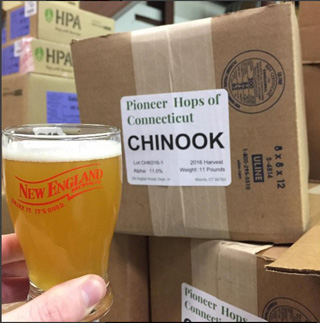 Pioneer Hops in Connecticut has begun calling hops known as Cascade elsewhere CONNcade and Chinook hops CONNnook.*
Pioneer Hops in Connecticut has begun calling hops known as Cascade elsewhere CONNcade and Chinook hops CONNnook.*
Before your knee jerks because you thought you heard the bullshit marketing alarm go off, consider that this might be truth in advertising.
Hop farmers, and of course brewers, in Michigan, Minnesota, Wisconsin, and now Connecticut have all commented about how less piney and resinous the Chinook they grow are than those from the Northwest. They are more tropical — mango and pineapple are popular descriptors, sometime peach — fashionable flavores these days. Brewers want tropical, but James Altweis at Gorst Valley Hops in Wisconsin says they are confused when they get a whiff of Wisconsin Chinook because the hops are expecting piney. “In the marketplace people are looking for the Chinook they know,” he says. So Gorst Valley renamed the variety Skyrocket.
Doug Weber decided to rename the Pioneer varieties at the suggestion of David Wollner at Willimantic Brewing. Earlier, Wollner wrote in the brewery newsletter about brewing Rail Mail Rye Pale Ale using Pioneer’s Cascades: “This beer is a perpetual favorite among our patrons and myself. Using local hops in a proven recipe and determining whether there would be a difference in the outcome was intriguing. The end result was patrons who weren’t familiar with this beer really enjoyed the fresh tropical fruit hop flavors and aromas, a winning combination for sure. Guests who are a bit more in tune with Rail Mail found the flavors and aromas to be different enough and ask what changed? I have to admit it’s quite different but truly enjoyable!”
Weber plans to plant 15 acres of hops this year, but did not rush into the business. “I spent two years talking to Connecticut brewers and researching the best ways to establish a commercial hop yard. Our goal is to be the go-to choice for local hops in the state of Connecticut,” he wrote in an email. “By talking to brewers, I learned a couple of things. 1) brewers are quite particular and they act more like laboratory chemists than restaurant chefs. 2) Demand for proprietary hop varieties is heavy, but brewers understand the way the business works. What this meant to us was that we had to produce an ingredient that had equal or better quality than what the brewers were accustomed to.”
(Pioneer hops sell for a premium, which naturally caps how much brewers will end up using. hat may change if local acreage increases, which is part of a business story for another time.)
Three quick asides:
– Hop terroir is real, and I will gone on about it.
– Renaming hops from public breeding programs can cause confusion although there are no legal barriers. Rogue Ales has renamed, and trademarked, all but one (Newport) of the public varieties it grows on its farm south of Independence, Oregon. The aroma and flavor of the hop it calls Freedom, for instance, may be different than the public variety grown elsewhere, but a little transparency [a chart that lists a hops public name] would be nice. So I like the Pioneer solution (just don’t ask me how other Connecticut farmers distinguish their hops). “I think the brands can help the brewers as much as they help hop growers,” Weber wrote. “It’ll be easier to tell beer drinkers, ‘The beer you are drinking is made with CONNcade, Cascade hops with unique flavors, grown here in the state of Connecticut.'”
– Chinook itself has a great back story. Released by the U.S. Department of Agriculture in 1985, it was selected as a seeedling from a cross 11 years before. Chuck Zimmerman crossed a female English hop and a male, labeled USDA 63012M, that was part of the breeding program at Prosser Station, Washington. The USDA acquired the female, Petham Golding, in 1968 from Wye College. 63012M had been selected from a cross between Brewer’s Gold and a wild hop collected in Utah.
Brewer’s Gold + Utah wild male = USDA 63102M
Petham Golding + USDA 63102M = Chinook
Recent DNA tests in Slovenia have confirmed that Golding is the mother of Chinook. However, when Ray Neve of Wye College in England visited Corvallis, Oregon, in 1977 for the International Hop Growers Convention Scientific Commission meetings, he was shown the plant reputed to be the Petham Golding mother plant. He didn’t think it had the right cone shape and arranged for cuttings to be sent to Wye. Virus tests on the regrowth showed it was infected with hop mosaic disease. Had it been a true Golding, that would have killed it quickly. Later, oil analyses of the cones confirmed that the plant in the Corvallis collection thought to be the mother of Chinook was not a Golding. What has happened to the actual Golding plant that was used to create Chinook is a mystery.
* You probably figured this out, but the photo at the top was taken before Weber chose the new name.
Hello. I thought that the Goldings grown in Slovenia are not Goldings at all but are really descendents of Fuggles?
Sorry for any confusion, Liam. Yes, hops called Goldings grown in Slovenia are offspring of Fuggles. That the DNA test took place in Slovenia is a coincidence.